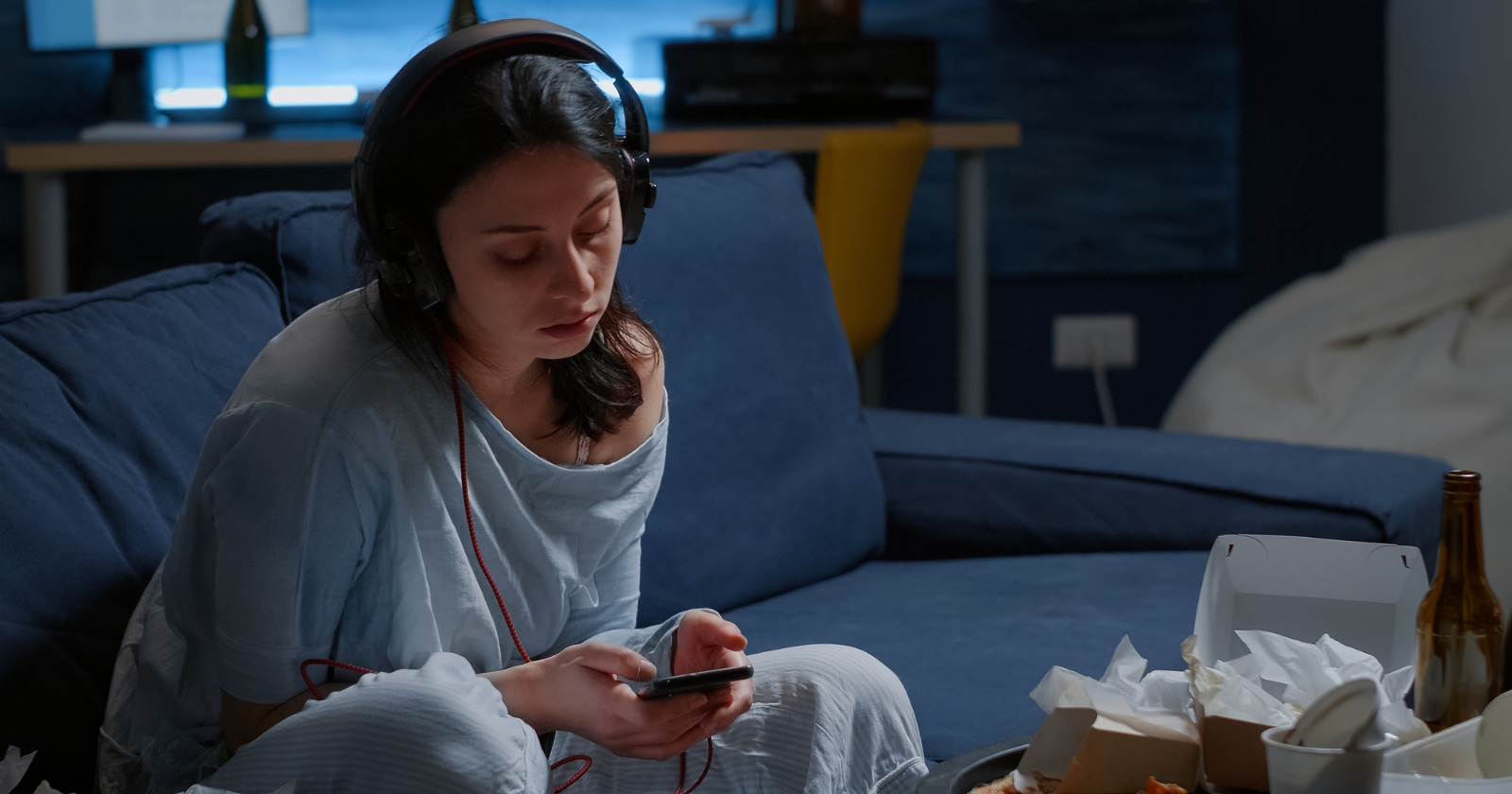In a world where virtual connection often overshadows real-life interaction, it’s easy to get swept up in the allure of social media.
But like any indulgence, too much of a good thing can have its downsides.
Let’s be honest, who hasn’t lost track of time scrolling through their feed, only to emerge hours later with a vague sense of emptiness?
If you find yourself prioritizing social media over real-life connection, you might want to pay attention.
This digital dependence can lead to some less-than-desirable traits.
So, let’s pull back the curtain and take a lighthearted, yet insightful look at eight common traits that can develop when your virtual life takes precedence over the real one.
1) Decreased face-to-face social skills
Living in the digital age has its own set of challenges.
And for those who prioritize social media interactions over real-life conversations, one of the most noticeable traits is a decrease in face-to-face social skills.
It’s not a surprise, really.
When most of your communication happens through likes, shares, and comments, actual person-to-person interaction can feel like stepping on foreign soil.
This is not to say that digital natives are anti-social or incapable of real-world communication. It’s just that the ease and simplicity of online interactions can make the complexities of face-to-face conversations more daunting.
This trait is not a given for every heavy social media user, but it’s a trend that’s hard to ignore.
The art of conversation is slowly giving way to the art of crafting the perfect tweet or caption.
Related Stories from Personal Branding Blog
But remember, while this trait is common, it doesn’t define every social media enthusiast. We’re all individuals, after all.
2) Fear of missing out
Ah, the infamous FOMO – Fear Of Missing Out.
This is something I’ve personally grappled with.
When you’re constantly connected to social media, it can feel like there’s always something happening somewhere, and you’re not a part of it.
I remember one evening when I found myself scrolling through Instagram while at a family dinner.
My cousin had posted photos from a beach party, and I felt a pang of regret for not being there.
The irony?
I was so engrossed in what I was missing out on, that I was actually missing out on the real-life connection happening around me at that very moment.
It’s a trait that many social media users can relate to. The constant updates and posts give us a window into countless moments we’re not part of.
And that can lead to a fear of missing out on something better, something more exciting.
But here’s the catch – life is happening all around us, offline. And sometimes, we need to disconnect to truly connect with it.
3) Altered sleep patterns
Did you know the artificial light from our screens can disrupt our natural sleep cycle?
It’s true. When we spend a significant amount of time on social media, especially right before bed, it can lead to restless nights and groggy mornings.
The blue light emitted by our screens suppresses the production of melatonin, the hormone that regulates our sleep-wake cycle.
This can throw off our internal body clock, leading to poor sleep quality and even insomnia.
Frequent social media users often find themselves in a vicious cycle – staying up late to scroll through feeds, struggling to wake up in the morning, and then turning to social media again to keep them awake during the day.
It’s not just a matter of feeling tired, though. Long-term sleep deprivation can have serious health consequences, including heart disease and diabetes.
So next time you’re tempted to check your feed before bed, consider the impact it could have on your sleep and overall health.
4) Increased anxiety
Navigating the world of social media can often feel like walking through a minefield of potential stressors.
From cyberbullying to the pressure of maintaining a perfect online image, it’s no wonder that heavy social media users can develop an increased level of anxiety.
This anxiety isn’t just about dealing with negative comments or comparing oneself to others.
It can also stem from the uncertainty of online interactions, where the absence of facial expressions and tone of voice can make messages hard to interpret.
Not to mention, the constant influx of information and updates can be overwhelming, leading to a state of chronic stress.
Remember, it’s important to take social media breaks and engage in activities that help reduce stress.
After all, your mental health is more important than any online trend or viral post.
5) Evolution of empathy

This is a tough one, and it tugs at my heartstrings. Empathy, the ability to understand and share the feelings of others, is such a crucial aspect of human connection.
But when we prioritize interactions on social media over real-life ones, this trait can evolve in unexpected ways.
Online, we’re exposed to a barrage of emotions and experiences from all over the world.
This can potentially broaden our empathetic scope.
However, it’s also easy to become desensitized to these emotions due to their sheer volume and the lack of personal connection.
And while social media provides a platform for us to express support or solidarity, these sentiments can often take the form of a quick reaction or comment – far removed from the personal, empathetic connections we form in face-to-face interactions.
It’s something to keep in mind as we navigate our digital lives.
Genuine empathy extends beyond a sympathetic emoji or a supportive comment. It’s about truly understanding and caring for each other – in person and online.
6) Dependence on validation
For a while, I found myself checking my phone every few minutes for notifications.
It was as if each like, comment or share was a mini affirmation of my worth. It’s not easy to admit, but the validation I received online began to matter more than my self-perception.
This isn’t uncommon among heavy social media users. The immediate feedback we receive online can be addictive.
The rush of getting likes or positive comments can give us a temporary high, a feeling of acceptance.
But over time, this can lead to an unhealthy dependence on external validation. Instead of finding worth within ourselves, we start to measure it by the number of likes on our posts or the followers on our profile.
It’s a stark reminder that while social media can be a great tool for connection and expression, it’s crucial to find value within ourselves first and foremost.
7) Decreased productivity
Let’s face it – social media can be an enormous time sink. One minute you’re just checking a quick update, and the next thing you know, an hour has passed and you’re deep into the rabbit hole of endless scrolling.
For those who prioritize social media over real-life connections, this decrease in productivity can become a significant issue.
Work, studies, and even personal growth can take a backseat to the seemingly endless stream of updates, posts, and viral videos.
It’s not just about lost time, though.
The constant distraction of social media notifications can disrupt our focus, making it harder to concentrate on tasks at hand.
So if you find yourself prioritizing social media over other aspects of your life, it might be worth reassessing your habits.
Remember, time is your most valuable resource – spend it wisely.
8) Dissatisfaction with real life
When we’re constantly exposed to the highlight reels of others’ lives on social media, it’s easy to start feeling dissatisfied with our own.
The trips we aren’t taking, the parties we aren’t attending, the achievements we haven’t accomplished – they’re all laid out for us to see and compare against our own lives.
This constant comparison can lead to dissatisfaction and even feelings of inadequacy.
Life isn’t always picture-perfect, and that’s okay. It’s important to remember that social media is just a snapshot of life’s best moments, not the whole picture.
So don’t let the curated images on your screen dictate your happiness or self-worth. Your life, with all its ups and downs, is worth celebrating.
Final words
So, there you have it – eight traits that often accompany a life lived primarily through a screen.
Remember, this isn’t about demonizing social media.
It’s a fantastic tool for connection and expression. However, like any tool, it’s all about balance.
Don’t let the digital world overshadow the beauty and richness of real-life interactions.
Put down your phone, step away from the screen, and engage with the world around you.
Embrace the awkward silences, the genuine laughter, and the messy imperfections of real-life connection.
After all, life’s too short to live it through a filter.









